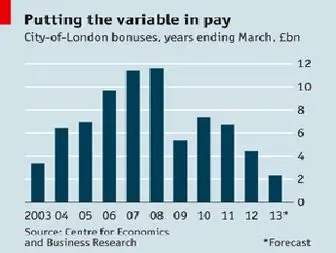
The answer of some policymakers is to restrict what can be pledged in the first place. On May 14th a committee in the European Parliament is due to vote on a proposal to limit bankers' annual bonuses to no more than their base salaries. The proposed rule, which would be wrapped into a European regulation raising capital standards on banks, is thought likely to win parliamentary assent. How far it gets after that is not clear, but the banker lobby is desperately short of politicians who will publicly defend big bonuses. "You can talk to me about it but I won't go anywhere near it,” was the response one lobbyist got from a sympathetic member of the European Parliament. Said another: "It makes absolutely no economic sense, but you probably deserve it anyway.”
Europe already has tough rules on pay, limiting the proportion of bonuses that bankers can dish out in cash, and requiring banks to hold back bonuses for several years. But proponents of the new rule think a cap on the quantum of bonuses is still needed.
Sony Kapoor of Re - Define, a think - tank that has campaigned for a cap on bonuses, reckons that bankers still have an incentive to take bets with a “tail risk” of unlikely but potentially large losses: a capped bonus would reduce that incentive. What is more, rules that claw back bonuses if the bank posts a loss may not change risk - taking behaviour if traders feel they can contribute directly to their own winnings but have little influence on the bank ' s overall profitability.
The proposed rule, however, introduces new dangers. It will almost certainly lead to higher basic pay for bankers. That will weaken banks ' ability to cut costs in downturns(see chart), which is not obviously helpful in ensuring the stability of the business. Depending on how it was applied, it could encourage American and Asian banks to move global businesses out of London. And it threatens to handicap European banks in markets such as Brazil or China, where competition for talent is fierce.
The aim of reducing risk in banking is a sound one. But it is best achieved by ensuring that banks are neither too big nor too complex to fail, not by getting the state to micromanage the way they reward their staff.
















